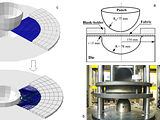A computationally efficient mesoscopic finite element model of textile composite reinforcement
Abstract
Resin transfer moulding is a well known process for obtaining a 3D double curved part of textile composite reinforcement. The deformations of the fibrous reinforcement could be very large and lead to defects in the part. A computationally efficient simulation method for woven composite fabric deformation at mesoscopic scale is proposed in this paper. The yarn behaviour is modeled by a specific continuum hypo-elastic constitutive law, associated to objective derivative based on the fiber rotation. Model parameters are experimentally obtained, and the validation includes the simulation of bias extension test and hemispherical forming test. Keywords: A. Fabrics/textiles B. Mechanical properties C. Finite element analysis (FEA) E. Forming

Publications
Meso modelling for composite preform shaping – Simulation of the loss of cohesion of the woven fibre network, S. Gatouillat, A. Bareggi, E. Vidal-Sallé, P. Boisse, Composites Part A: Applied Science and Manufacturing, Volume 54, November 2013, Pages 135-144, ISSN 1359-835X, DOI code
